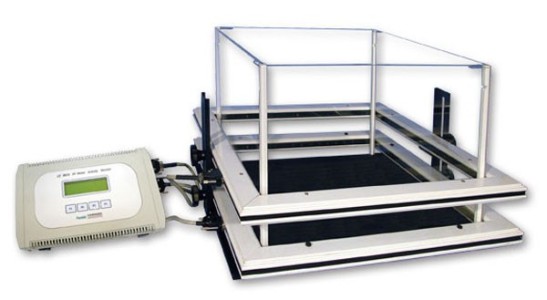Authors
D. Deplanque, V.R. Venna, R. Bordet.
Lab
Université Lille-Nord de France, Institut de Médecine Prédictive et de Recherche Thérapeutique, Département de Pharmacologie médicale-EA 1046, Lille, France.
Journal
Behavioural Brain Research
Abstract
Depression is a frequent but often unrecognized and under treated complication of stroke that has scarcely been investigated in animal models particularly regarding treatment issues. Using the Forced Swim Test (FST) and testing spontaneous motor activity, we studied whether a transient focal cerebral ischemia modifies mice behaviours and antidepressant drug effects. We first evaluated whether FST realized 2 days or 1 week after brain reperfusion may be routinely used in male Swiss mice previously submitted to a 15, 30 or 60-min transient occlusion of the right middle cerebral artery. We then evaluated behavioural changes up to 5 weeks in mice previously submitted to a 15-min ischemia. Behaviours according to the administration of imipramine or fluvoxamine at 1 and 5 weeks after a 15-min ischemia were finally evaluated. Transient ischemia was associated with a decrease in immobility in the FST performed 2 days after reperfusion while no changes were observed in 1 and 5 weeks post-ischemia groups. Changes were related neither to brain ischemia duration nor to infarct volume. At both 1 and 5 weeks after brain ischemia, a dramatic decrease in the antidepressant response to imipramine related to a decrease in climbing behaviour was observed while the effects of fluvoxamine were improved through an increase in both climbing and swimming. Behaviours in the FST were unrelated to any spontaneous motor activity changes. Responses to anti-depressant drugs are strongly modified in mice previously submitted to brain ischemia. Present results underline that not all antidepressant drugs are appropriate after ischemic stroke.
BIOSEB Instruments Used
Infrared Actimeter (LE8815)
Source :
http://www.sciencedirect.com/science/article/pii/S0166432811000283

 Pain - Thermal Allodynia / Hyperalgesia
Pain - Thermal Allodynia / Hyperalgesia Pain - Spontaneous Pain - Postural Deficit
Pain - Spontaneous Pain - Postural Deficit Pain - Mechanical Allodynia / Hyperalgesia
Pain - Mechanical Allodynia / Hyperalgesia Learning/Memory - Attention - Addiction
Learning/Memory - Attention - Addiction Physiology & Respiratory Research
Physiology & Respiratory Research











![Dynamic Weight Bearing 2.0 – Postural Module [Add-on]](https://bioseb.com/733-home_default/dynamic-weight-bearing-20-add-on-postural-module.jpg)
























 Pain
Pain Central Nervous System (CNS)
Central Nervous System (CNS) Neurodegeneration
Neurodegeneration Sensory system
Sensory system Motor control
Motor control Mood Disorders
Mood Disorders Other disorders
Other disorders Muscular system
Muscular system Joints
Joints Metabolism
Metabolism Cross-disciplinary subjects
Cross-disciplinary subjects CONFERENCES & MEETINGS
CONFERENCES & MEETINGS 